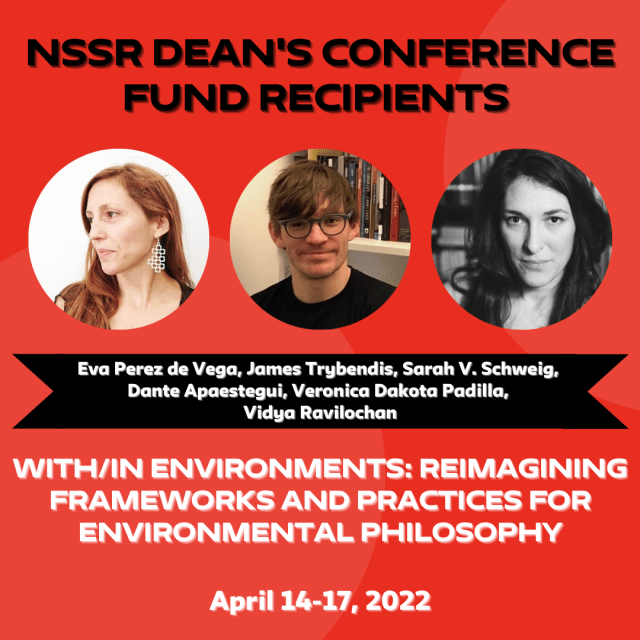Meet NSSR’s Fall 2021 MA Project Grant and Dean’s Conference Fund Award Recipients
As part of a commitment to socially engaged and meaningful research, the NSSR Dean’s Office supports a range of student-organized projects and conferences each year. Even amid a pandemic, NSSR students have envisioned incredibly creative, intellectually rigorous, and community-minded projects and conferences. Read on for more about the Fall 2021 recipients of our MA Project Grants and the Dean’s Conference Fund, who are launching their projects and conferences in 2022.
MA Project Grants
NSSR launched the MA Project Grant program in 2016 to improve the research environment and academic life for master’s students. Every semester, student join together to create and launch projects across disciplines that address pressing contemporary questions while also building lasting community at the school.
The Fall 2021 recipients of the MA Project Grants are:

UN:RESOLVED (by The En[…]Clothed Collective)
In an attempt to explore how clothing acts as a mediator between various “bodies,”
states and environments, En[…]Clothed collective hones in on the lived experience of embodiment at the intersections of design practice, material culture, philosophy, religion, anthropology, and sociology.
Organizers: Gabrielle Vazquez (Anthropology) and Fiona Dieffenbacher (Parsons)

The Faculty for Meditative Research and Learning (FMRL)
Drawing from the disciplines of Psychology, Anthropology, Political Science, and Philosophy, FMRL is a forum for scholars and practitioners who are engaging with meditation and contemplative practices as unique areas of scientific inquiry, areas that have been historically ignored by the Western academy but are now gaining widespread attention due to their implications in public health and consciousness studies.
Organizer: Jon Epstein (Psychology)
Dean’s Conference Fund
Often times trans- and interdisciplinary, NSSR student-run conferences blur and contest traditional lines inside and outside of academia and are one of the most productive sites for intellectual growth at the school. They are also where students begin to make their mark as active scholars in their field.
In Spring 2022, the Dean’s Conference Fund will support the following NSSR student-run conferences:

Athlete Mental Health and Well-being Symposium
In response to the worldwide need to While athletes are celebrated for doing the impossible physically, there has been growing recognition that athlete mental health has been greatly overlooked. Must well-being come at the expense of competition? What would sports look like if wellbeing and mental health were seen as integral to training, competition, and injuries? Efforts to transform sports culture will require diverse perspectives and frameworks.
Date: January 28, 2022
Organizers: Nicole Ross and Chloe Sherrill (Psychology)

Political Concepts Graduate Student Conference
The second graduate Political Concepts conference will convene students from all fields of study at NYU, UC Riverside, Harvard, and Duke at NSSR, each focusing on a single concept – including abolition, statistics, and paradise – with the express intention of resituating its meaning in the field of political discourse.
Dates: March 25-27, 2022
Organizers: Helia Faezipour (Politics), Allan Hillani (Philosophy), Clover Reshad (Politics), Jochen Schmon (Politics), Paula Cucurella, Christina Chalmers

Decolonizing Eastern European Studies – Knowledge as an Object of Inquiry
Since the end of the Cold War, numerous attempts have been made to understand the nature of the transformation taking place in Eastern Europe and the ongoing legacy of socialism. Conceptualized through the lenses of postsocialism and more recently postcolonialism, the changing characterization of the region has marked the shifting politics of representation and politics of identity. The aim of this conference is to critically assess and challenge these dominant conceptual frameworks.
Tentative dates: April 6-8, 2022
Organizers: Karolina Koziura and Agnes Szanyi (Sociology)

With/In Environments: Reimagining Frameworks and Practices for Environmental Philosophy
The 20th Annual NSSR Graduate Student Philosophy Conference asks how we might reorient the language and practices of philosophy in a way that can enable us to adequately respond to ongoing environmental crises.
Dates: April 14-17, 2022
Organizers: Dante Apaestegui, Veronica Dakota Padilla, Eva Perez de Vega, Vidya Ravilochan, Sarah V. Schweig, James Trybendis (Philosophy)

Contradictions in Capitalism: Feminist Perspectives
This conference explores the deepening tensions inherent within capitalism that both shape and are shaped by dynamics of exploitation. While feminist movements have identified the contradiction between production and reproduction as a central contradiction in capitalism, the categories of class and race point to the contradictions of extractivist capital accumulation and exploitation of labor performed by racialized and expropriated populations. Far from being accidental or exceptions to an otherwise functional economic system, structural violence and asymmetries arising from these contradictions are persistent because they form the very foundation of capitalism. This conference seeks to foster an interdisciplinary dialogue, situating academic knowledge production within the social movements that inform its analyses.
Dates: April 23, 2022
Organizers: Altaira Caldarella (Gender and Sexuality Studies), Patrich Co (Politics), Charlie Ebert (Philosophy), Penelope Kyritsis (Economics), Mette Kierstein Nielsen (Gender and Sexuality Studies), Lena Nowak-Laird (Philosophy), Isaiah Turner-Wyatt (Philosophy), Cassandra Williams (Sociology)

Sex Workers Built the Internet
Porn built the internet. Erotic BBS groups built the internet. Camming built the internet. Craigslist Casual Encounters built the internet. Desire built the internet. “Sex Workers Built the Internet” addresses this deleted history, centering sex workers’ experiences, voices, and activism in an urgent retelling of the internet’s past, present, and possible futures.
Date: May 2022
Organizers: Sarah Epstein (Psychology) and Livia Foldes (Parsons)



